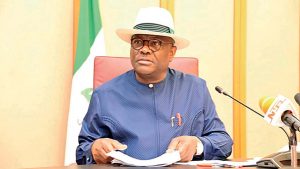- To stimulate economy via investments in commerce, tourism
- N38bn for loans repayment
- 86bn to support SMEs development, social investment, jobs creation
Rivers State, rich in crude oil and gas deposits, with a gross domestic product economy of over $33.69 billion, is pursuing a higher capital expenditure (capex) of 68.18 percent or N305.9 billion in its 2021 budget of N448.6 billion, presented to the state House of Assembly by Governor Nyesom Wike.
The capex is twice higher than the recurrent expenditures budget of N142.78 billion. The capex is broken into: administrative sector, N87.79 billion; economic sector, N105.07 billion; law and justice, N1.74 billion; social sector, N132.65 billion; and deductions/loan repayments N38 billion.
Perhaps, Governor Wike is riding on the behest of strong performance of the 2020 budget, despite declined federal receipts. He said, at the end of October 2020, total net revenue collected by the state was N226.52 billion, representing about 75 percent overall proportional performance. Also, the state overshot its internally generated revenue by over N20 billion.
The governor explained that the capital budget will be deployed to advance economic growth and social progress in the state by targeting and prioritizing investments. Particularly, the governor said the state has provided N6 billion in the 2021 budget to stimulate economic growth through investments in commerce, culture and tourism, mineral resource development, as well as address environmental challenges to improve the quality of life of all residents.
By far, a huge sum from the capex budget would go to infrastructure development. At least seven flyover bridges are on-going in Port Harcourt, the state capital, with one commissioned last month by Babatunde Fashola, minister of works. Governor Wike said N82.95 billion has been provided for roads and bridges, including completion of flyover projects at Okoro-Nu-Odo, Rumuola, Rumuogba, and Port Harcourt GRA junction.
Meanwhile, Governor Wike said the state government will also deliver the Ogoni–Andoni–Opobo unity road, Eastern Bypass dualization, 6th and 7th flyover projects and the Wakama Road, as well as all other on-going rural roads in the communities and local government areas across the State.
The proposed Rivers 2021 budget, christened, “Budget of Recovery and Consolidation,” surpasses the 2020 revised budget of N300.37 billion by more than N148.29 billion or 49.37 percent.
Aware of Nigeria’s second recession in five years, with headline inflation at 14 percent, and the projection by the federal government of a possible exit of the recession in Q1 of 2021, Governor Wike said, Rivers’ policy thrust for the 2021 budget will be to accelerate economic recovery, drive growth and create opportunities for social progress; enhance human capital development and tackle poverty; build first class infrastructures to accelerate socio-economic development.
Similarly, the governor said N13.86 billion of the budget has been provided to fund various social and economic investment schemes to support the development of small and medium scale businesses, as part of efforts to create jobs and reduce poverty. Also, N16.10 billion will be spent on targeted investments in the agriculture value chain in a bid to create employment and enhance collective food security of the state, in view of the economic challenges posed by the Covid-19 pandemic, which has clearly exposed the state’s vulnerability to food insecurity.
The sum of N30 billion was budgeted for education in the 2021 fiscal year. The governor noted that quality public education remains the key to breaking cycles of poverty, hence the amount would go into boosting educational infrastructure, enhance access and retention rates and improve educational outcomes in schools throughout the state. Health care sector received N25.11 billion. According to him, government will focus on completing the zonal referral hospitals at Ahoada, Bori, Degema, Okehi and Omoku, which are all at advanced stages of completion. The budget also prioritized combating insecurity to keep residents safe and secure.








